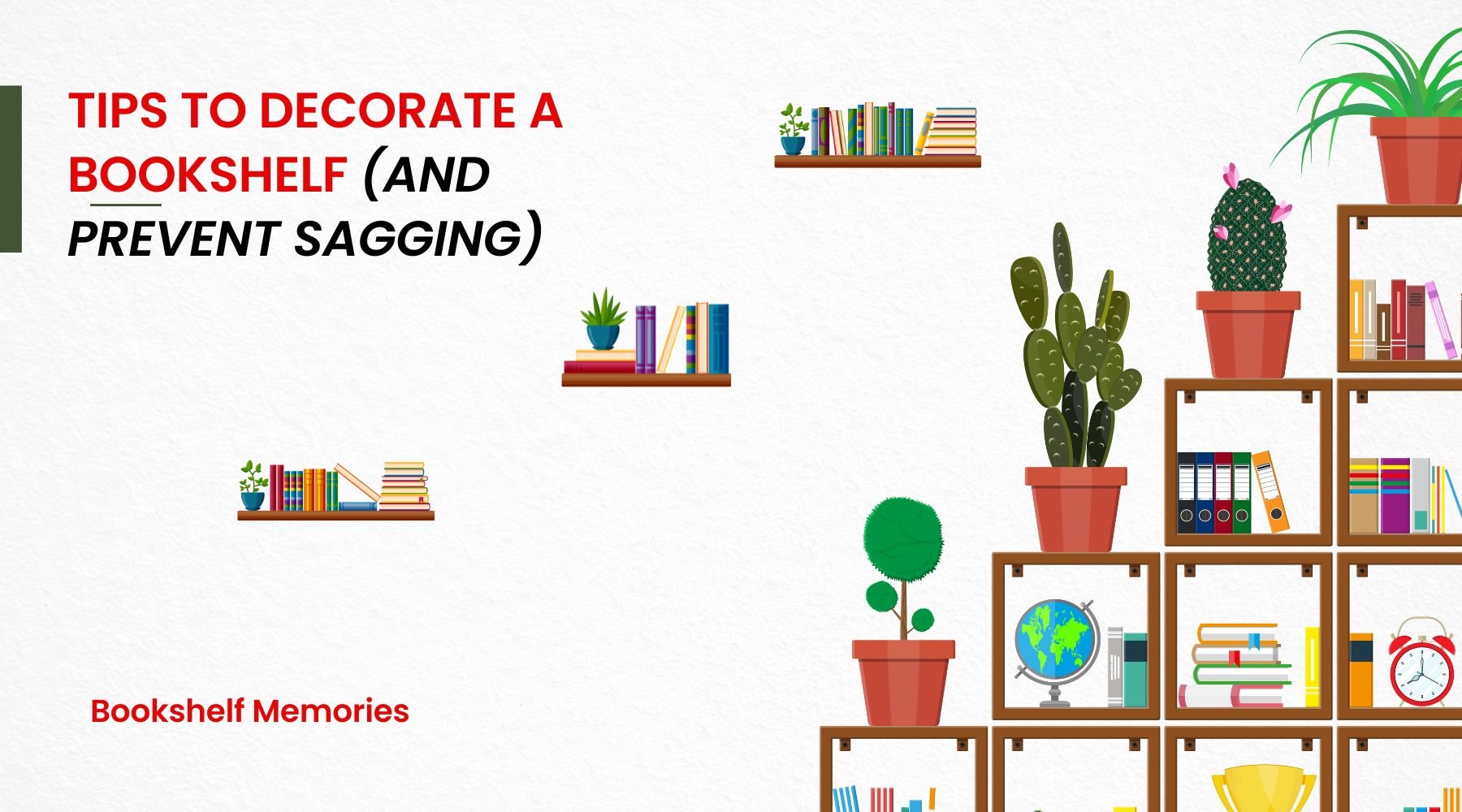Bookshelves Vs Bookcases
For clarification, a bookshelf can be any shelf and it can be standalone too—just the one shelf as a backdrop behind your desk, or above a bedside unit, or over your sofa. A bookcase is generally a floor-standing unit, or a collection of shelves installed in a permanent recess in the room, such as an alcove. You can build bookcases with shelves. The only real difference is the ends.
Bookcases are close-sided, and bookshelves are open-sided. You can hang trailing plants from both, but on a bookcase, plants would only trail down the front, blocking some of the accessories. In contrast, on an open-sided bookshelf, you can have trailing plants spill over the side, leaving all the accessories on the shelf visible from the front.
The Why of Organizing Your Bookshelves
Despite the improvement in design aesthetics, there’s a very real benefit to spending time organizing your bookshelf display. That’s to prevent sagging. Unless your shelves are small and made with thick and quality wood, there’s a possibility of the shelf sagging under the extreme weight of books. Particularly, hardbacks.

How to avoid sagging shelves is to either use multiple small shelves in a row or place heavy objects closer to the ends with lighter-weight items in the center. For large book collections, always use solid boards for shelves. No composite materials, such as chipboard as those can’t cope with the weight of a full load of books. Solid boards of around 3/4” thickness hold heavy loads well. If the shelves do sag slightly eventually, remove it, turn it upside down, and put it back. It’ll straighten out in time.
Accessories for Bookshelves
The size of the accessories will depend upon the shelf space you have available. The most impressive bookshelves are similar to bespoke gallery wall displays with photographs. They follow a theme. You can do the same with every bookshelf you have. Have a bookshelf with a travel theme, or a hobby theme, or for home comforts with earthy color tones, opt for a Japandi design, which is a hybrid of Japanese design but with the Scandinavian design favorite of hygge. A simple way to keep the color tones neutral is to put the colorful bookbinders to the back so that the pages are front-facing.
Before attempting to style your bookshelf, gather the collections of items that will be used. The books, bookends, completed book nook kits, craft pieces, miniature ornamentals, plants, vases, ornamentals, sculptures, and any ceramics you want to include. An ideal collection of items for bookshelf decor includes things of various shapes, heights, colors, and textures, and for the finishing touch, a plant of some type to introduce some greenery.
Styling with Symmetry and Balance in Mind

The styling part is the trickiest, especially with smaller items. The smaller the items are, the easier it is to create what looks like clutter. The simplest way to fill empty voids with smaller items is to group and stack them. Instead of laying a row of succulent plants, group them, rest them on top of some stacked books, and have a couple of taller items around the tiny pieces.
What you’re looking for is groupings of equal numbers following a similar pattern. Small, medium, and large. Provided your shelves have adequate depth, you’ll be able to layer your grouped items too, perhaps with a large mirror to the back of plants or candles to give the illusion of increased depth.
A tip from interior designers is to have an odd number of items in your groupings. The rule of three is common. For your display books, use what’s described as “coffee table books”. As decor pieces, these are the oversized books that are stacked on coffee tables, rather than stood upright on a bookshelf.
To personalize your bookshelves, use coffee table books with topics you’re interested in. You can find interesting cover designs in all manner of topics ranging from art, aviation, dance, anthropology, cars, and travel, to exotic animals. These are the books to use as a stacked display and have your standard height books stand upright but placed off-center on a bookshelf to prevent overloading it with too much weight in the middle.
Hiding Books Behind Hung Art

Depending on the number of books you have, whether you want to hide certain titles for privacy, or would prefer to disguise colors that appear to make a mockery of your color scheme, you can do so easily. Take a canvas print, a couple of screw eye hooks, and a chain to hang the canvas over the front of your books. Or any part of a bookshelf that you would rather remain hidden. It could be to keep your ratty student books, jotters, doom boxes, or baskets (DOOM being an acronym for “Didn’t Organize, Only Moved”).
Rather than have chaos spill over onto carefully decorated bookshelves, such as glass cases, Post-It stacks, stationery, and the various literature gifts readers accumulate, they can be stashed away in boxes and hidden behind a canvas print, latched onto a shelf above, acting like a swinging door to access non-decorative apparel.




Share:
DIY Bookbinding Techniques
How Do You Light a Book Nook?